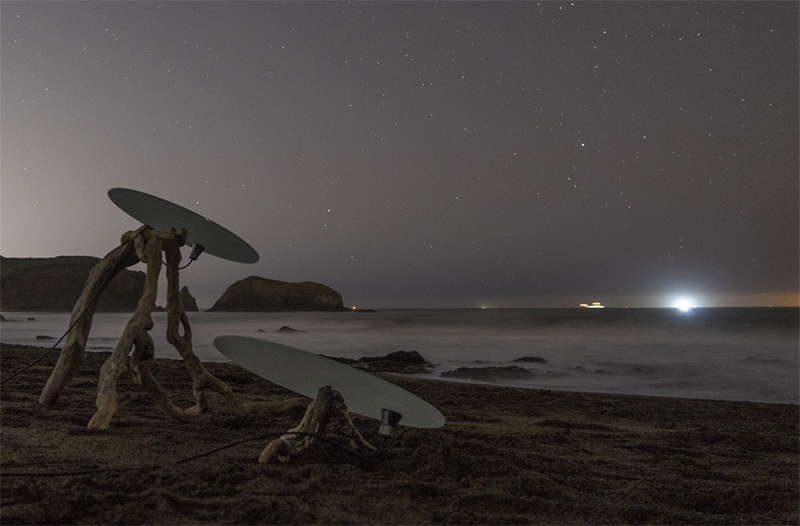Siren Songs

Siren Songs (12:35, 2020).
Three glass discs, the Pacific Ocean, bowed clamshells, and sand.
Best listened to in a quiet environment on quality headphones or speakers.
Siren Songs grew out of a fixation on monochrome sparked by Michelle Stuart’s Zacaba. Her piece brought to mind how things that appear monochromatic from a distance, or at first glance, often contain a multitude of inflections and nuances, riches available to those who invest in close attention. I began wondering what the audio equivalent of monochrome would be. White noise? A drone? Wind? The ocean? This led me to Rodeo Beach in the Marin Headlands on a chilly late-December night, where I taped contact mics to three large glass discs and set them on stands at the edge of the Pacific. Looking like mini-satellite dishes, they angled out to sea and up to the stars. Blinking ship lights traversed the horizon line, airplanes cleaved through constellations, and I listened to filtered sea and half-imagined voices. My kind of monochrome.

In the studio I decided to play the discs again, this time swinging a pendulum above them that dropped sand onto the glass, a nod to Terry Fox’s Pendulum Spit Bite. What most struck me about Fox’s piece, though, was that his pendulum had eaten away at the base material, not added to it. Similarly I was attracted to how Joan Jonas had drawn and then erased her sketches in Hurricane Series. So much of composing is adding, but I started to think I needed to focus more on subtracting. I took my glass-filtered ocean and sand recordings and filtered them again digitally into narrower frequency bands, creating drones that emphasized the overtones of each piece of glass. From my collection of natural objects, I selected clamshells whose voices echoed or enhanced the drones, coaxing subtle exhalations out of them with child-sized violin bows.

Through layering and de-layering my recordings while continuously navigating from one myopic lens to another, a composition emerged. Along the way I thought of Charles Gaines’s Walnut Tree Orchard graphs, how ocean waves frozen in photographs look like mountains but you can’t go hiking on them, of fake news and social media feedback loops, the power of reflections and mirages. I thought of how the inability of humans to see the big picture, on one hand, and grok the intricate complexities of natural systems, on the other, has brought the planet to the brink of catastrophe. My piece ends with an “unfiltered” recording, but really that’s a lie. What I recorded is still shaped by so many choices. Sometimes we can expand or shift our filters but there’s no escaping them altogether. I can only ever hear pieces of the ocean.